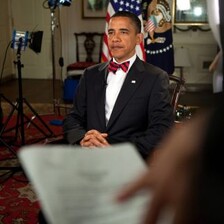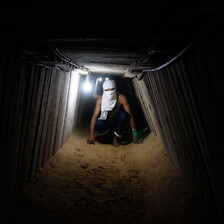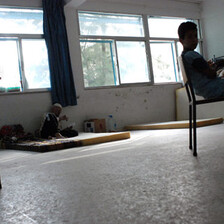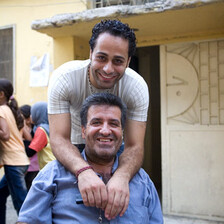Electronic Lebanon 26 March 2010
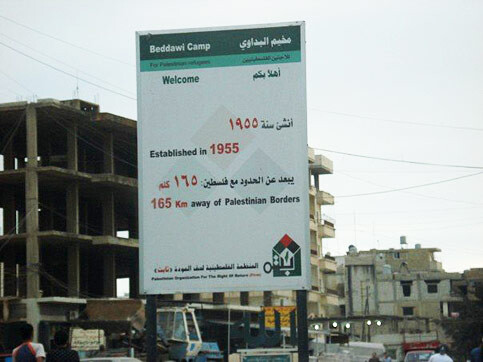
Baddawi refugee camp, 2007. (Marcy Newman)
The relationship between the Lebanese government and the Palestinian refugee camps in Lebanon is changing. The process of redefining the old relationship began explosively with the battle and subsequent demolition of the Nahr al-Bared refugee camp, near the northern city of Tripoli, in 2007. Now the Lebanese army is erecting a barrier around the nearby Baddawi refugee camp because of “security concerns.”
According to Baddawi’s Popular Committee, which is comprised of different Palestinian political groups and governs the camp, the Lebanese army claimed that the barrier is being built to prevent smuggling and the infiltration of Islamic extremists into the camp. When questioned about the barrier encircling Baddawi, representatives of the Popular Committee expressed a policy of official neutrality. They repeatedly insisted that the barrier is an expression of Lebanese sovereignty and that it did not impact the camp in any way. “You have to realize that there is total cooperation between us and the [Lebanese] army,” said Abu Riyad, a representative for the Palestinian Popular Struggle Front in Baddawi’s Popular Committee.
Despite this diplomatic front, within the camp there is an underlying tension regarding the barrier. A recent article in the Arabic-language newspaper Ad-Dayar reported that European sources believe that Fatah al-Islam, the organization that infiltrated the Nahr al-Bared refugee camp and fought the Lebanese army in 2007, retains a presence in Baddawi. However, Palestinian leaders in Baddawi categorically deny the charge that there are Islamic extremists present in the camp. Furthermore, they insist that they work closely with the Lebanese army to prevent infiltration by extremist groups. “This [fence] is not for our protection; we are saying that this checkpoint is being created by the government for their own interests, it is not for us at all,” Abu Mohammed, an independent member of the Popular Committee, stated.
Fighting in and around the Nahr al-Bared refugee camp in the summer of 2007 lasted for three months and left 50 Palestinian and Lebanese civilians dead, as well as 180 soldiers of the Lebanese army. The conflict is shrouded in mystery and much remains unknown about the origins and true intentions of Fatah al-Islam. What is known is that the group was mostly made up of fighters that were non-Palestinian Arabs who embedded themselves into the Nahr al-Bared camp. There were failed attempts by the Palestinian factions to remove Fatah al-Islam from the camp. Tensions came to a head in March 2007 when armed clashes erupted between the Palestinian Fatah organization in Nahr al-Bared and fighters with Fatah al-Islam.
The result of the fighting between Fatah al-Islam and the Lebanese army was devastating. The Nahr al-Bared refugee camp was completely destroyed and 33,000 Palestinian refugee civilians were displaced. Many of these refugees went to the nearby Baddawi camp whose population nearly doubled from 16,000 to 30,000. Lebanese-Palestinian relations were also heavily strained nationally and locally. This was compounded by the fact that many of the Lebanese army soldiers who lost their lives in the fighting came from the surrounding areas of the camp.
Another layer of fear and distrust was added to the already deeply troubled relationship between the Lebanese residents and Palestinian refugees. Periodically, ever since the end of the siege of Nahr al-Bared, media reports have circulated about the dangerously volatile situation in the camps. The unofficial nature of Fatah al-Islam has also increased fears of “sleeper cells” of the group existing in other Palestinian refugee camps.
A recent spate of inter-factional violence between Palestinians in Ein al-Hilweh, the largest Palestinian refugee camp in Lebanon, added to the already intense fears about the security of the Palestinian refugee camps in Lebanon. This violence led Ali Barakeh, a representative of Hamas in Lebanon, to warn that “We won’t allow Ein el-Hilweh to become another Nahr al-Bared.”
From the perspective of the Lebanese government the key to resolving the issues plaguing the Lebanese-Palestinian relationship begins with disarming Palestinian groups inside and outside the refugee camps. In a recent interview with the Kuwaiti news agency KUNA, Lebanese Prime Minister Saad Hariri said that “Lebanon is responsible for the security of Palestinians and we, as Lebanese, have also a responsibility to secure the refugees a decent life.” He added, “I intend to summon the leaders of Palestinian factions with military bases outside the camps and inform them on Lebanon’s clear position,” in reference to the disarmament of Palestinian groups outside the camps and the role of weapons in the camps.
Palestinians in Lebanon view the issue of disarmament warily. Chief among their concerns is not weapons, but civil rights. In particular, Palestinians are denied the right to work in Lebanon in a range of blue- and white-collar professions.
The Lebanese Palestinian Dialogue Committee was created in October 2005 with a mandate to address these three central issues (in addition to a fourth to establish a representative office for the Palestine Liberation Organization). Although it has had little success on three of the four points, it did facilitate the establishment of a representative office for the Palestinians in Lebanon. The lack of movement on the Palestinian file is despite the apparent internal consensus on the issue, which was confirmed by the Lebanese National Dialogue of 2006, but has been overtaken by Israel’s July 2006 invasion of the country and subsequent internal political discord.
Prime Minister Hariri has promised to place the Palestinian file at the center of his mandate in office. This was signified by the file being given to Minister of State Wael Abu Faour and that led to Ambassador Khalil Makkawi, the President of the LPDC, to resign. Reform of the LPDC is underway and it remains to be seen when and if the committee’s mandate will be enacted. In the meantime, the Palestinian refugees must continue to wait.
Born in the Rafah refugee camp in the Gaza Strip, Ahmed Moor graduated from university in Philadelphia, after which he spent three years working in finance in New York. He is currently based in Beirut, Lebanon.
Deen Sharp is a freelance journalist and consultant based between Beirut and London. He has worked extensively on Lebanese political issues and Palestinian refugees in Lebanon over the past three years for a range of publications and nongovernmental organizations including Executive Magazine, Foreign Policy Centre, Albany Communications and UN-Habitiat.
